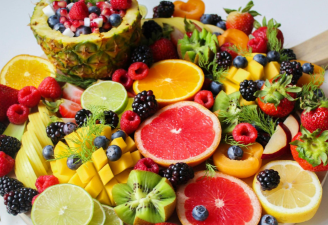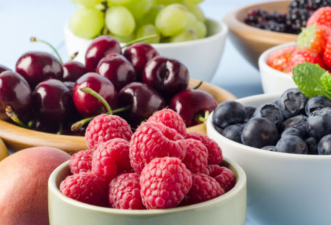These Summer Fruits Are Perfect for Your Skin
Eating fruit in the summer is good for your skin. Fruits like watermelon, strawberries, blueberries, lemons, oranges, grapes, kiwi, pineapple, peaches, and cantaloupe are rich in vitamin C, polyphenols, flavonoids, anthocyanins, and other nutrients. They have antioxidant, anti-inflammatory, moisturizing, whitening, and anti-wrinkle properties.
Eating fruit in the summer is good for your skin. Fruits like watermelon, strawberries, blueberries, lemons, oranges, grapes, kiwi, pineapple, peaches, and cantaloupe are rich in vitamin C, polyphenols, flavonoids, anthocyanins, and other nutrients. They have antioxidant, anti-inflammatory, moisturizing, whitening, and anti-wrinkle properties. They can reduce free radical damage to the skin, prevent aging and dark spots, and make the skin more hydrated, fairer, smoother, firmer, and more elastic. It's important to note that fruit cannot replace medication for skin conditions. If you have skin problems, seek medical attention promptly. While fruit is beneficial, avoid excessive consumption.

- Citrus fruits: These include oranges, grapefruits, lemons, and tangerines. These fruits are rich in vitamin C, an antioxidant that inhibits melanin formation, helping to reduce dark spots and dullness, leaving the skin brighter and fairer. Vitamin C also promotes collagen synthesis, a key component in maintaining skin elasticity and firmness. 2. Berries: Fruits such as strawberries, blueberries, blackberries, and raspberries are rich in vitamins, minerals, and antioxidants. Vitamin E, a fat-soluble antioxidant, protects the skin from sunburn, moisturizes it, and maintains its hydration. Anthocyanins, a unique antioxidant found in berries, can improve skin condition.
- Stone fruits:Fruits such as peaches, plums, and apricots contain a variety of vitamins and minerals. B vitamins promote skin metabolism and ensure normal physiological functions. Minerals such as potassium and magnesium help maintain skin moisture balance and keep it hydrated. The natural pectin in peaches promotes intestinal motility, aiding in the elimination of toxins, and indirectly improving skin condition, leaving it clearer and healthier.
- Melons: Fruits such as watermelon, cucumber, and cantaloupe are high in water and replenish moisture, keeping the skin hydrated and plump, and making it appear more radiant. Melons also contain a certain amount of vitamins and minerals, such as vitamin C, vitamin E, and silicon in cucumbers. Vitamins C and E act as antioxidants, while silicon helps strengthen the skin's connective tissue and make it more elastic.
It's important to note that fruit's effects on the skin are limited and cannot replace medication. Furthermore, most fruits contain sugar, so diabetics should control their intake.

Precautions for Daily Fruit Consumption
- Fruit surfaces may harbor contaminants such as pesticides, bacteria, and dust, so they must be thoroughly washed before consumption. Fruit with uneven surfaces, such as strawberries, should be soaked to ensure cleanliness.
- It's best not to eat fruit immediately after a meal, as this can cause bloating and constipation. It's recommended to eat fruit between meals or an hour before meals to facilitate digestion and absorption. Although fruit is nutritious, it should be consumed in moderation. Excessive fruit consumption can increase blood sugar and increase the risk of obesity.
- People with allergies should be aware of their allergens and avoid fruits that are prone to allergies, such as mangoes and pineapples. People with weak spleen and stomachs should avoid large amounts of cooling fruits like watermelon and pears. People with excessive internal heat and phlegm and dampness should eat less hot fruits such as longan and lychee.
